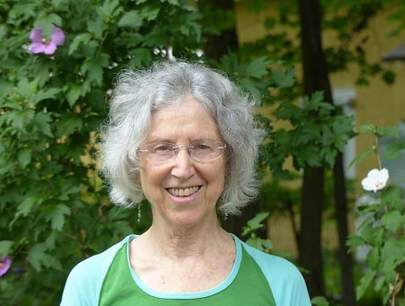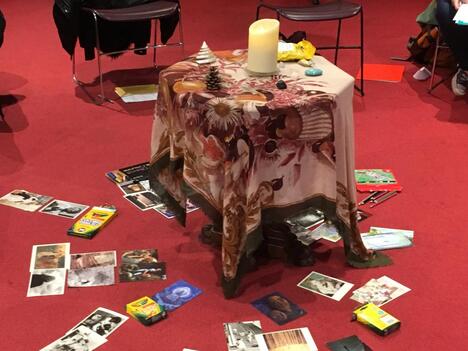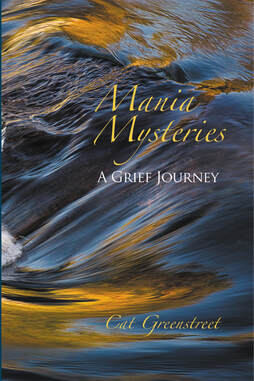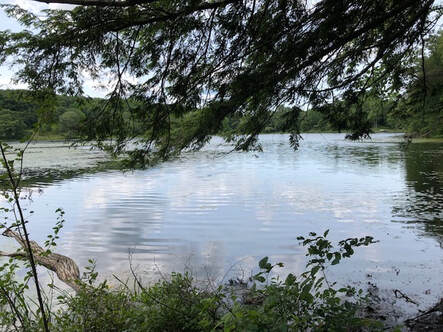Career Journey
A Journey through Grief to Ultimate Reinvention
Interview with Cat Greenstreet, M.Ed., Educator, Retreat Facilitator & Author
August 2019
Interview with Cat Greenstreet, M.Ed., Educator, Retreat Facilitator & Author
August 2019
About Cat:
Cat Greenstreet, M.Ed., has been a Courage & Renewal® Facilitator since 2006. She was an educator for 30 years and devoted the last 20 of those to Waldorf® education as an elementary and middle school teacher, a high school English and drama teacher, a teacher educator, and school leader. She taught English in colleges throughout the New York metropolitan area and worked in business as a technical writer.
Cat is the author of Mania Mysteries: A Grief Journey and currently offers Courage & Renewal retreats as well as one-on-one Clearness Conversations, based on Clearness Committees. A thread through all of her work has been creating spaces in which people of all ages can be in touch with their core selves, heal, and realize their full potential.
Cat also loves to garden, play the electric bass, sing in choirs, dance, and knit hats.
Cat Greenstreet, M.Ed., has been a Courage & Renewal® Facilitator since 2006. She was an educator for 30 years and devoted the last 20 of those to Waldorf® education as an elementary and middle school teacher, a high school English and drama teacher, a teacher educator, and school leader. She taught English in colleges throughout the New York metropolitan area and worked in business as a technical writer.
Cat is the author of Mania Mysteries: A Grief Journey and currently offers Courage & Renewal retreats as well as one-on-one Clearness Conversations, based on Clearness Committees. A thread through all of her work has been creating spaces in which people of all ages can be in touch with their core selves, heal, and realize their full potential.
Cat also loves to garden, play the electric bass, sing in choirs, dance, and knit hats.
Myrna Beth Haskell met Cat at a café in Millbrook, NY to discuss her journey in education, her work as a retreat facilitator, and how the death of her sister and other major life changes plunged her into a manic episode that she later realized became a catalyst to renewed self-realization.
Walk me through your experience as a teacher.
Much of my time teaching was spent in Waldorf® education.* I taught at the elementary, middle school, and high school levels. I also held a leadership role as High School Chair, after helping to start a new section of the school, and as a teacher educator. Waldorf education is developmentally-based. It addresses the needs of the growing child and inspires life-long learning. It also fully integrates the arts into its teaching methodology and aims to nurture a student’s physical, emotional, intellectual and spiritual development.
*Waldorf education has its roots in the spiritual-scientific research of the Austrian scientist and thinker Rudolf Steiner (1861-1925). According to Steiner's philosophy, the human being is a threefold being of spirit, soul, and body whose capacities unfold in three developmental stages on the path to adulthood: early childhood, middle childhood and adolescence. (WaldorfEducation.org)
Tell me a bit about Courage & Renewal® retreats. What encouraged you to be prepared as a facilitator?
In 2003, I began participating in Courage & Renewal retreats, which allowed me to stay in touch with my “inner teacher” and have the courage to act on the inner changes I was going through at the time. Whether facilitating and/or participating, the retreats renewed me inwardly, so that I returned to very stressful work more alive, present, and able to be a courageous leader. Facilitating retreats also offered me an ongoing community of co-facilitators and participants. Facilitators follow a set of principles and practices and offer Touchstones as guidelines to creating a Circle of Trust®, a disciplined, safe space to reflect on soul and role.
Walk me through your experience as a teacher.
Much of my time teaching was spent in Waldorf® education.* I taught at the elementary, middle school, and high school levels. I also held a leadership role as High School Chair, after helping to start a new section of the school, and as a teacher educator. Waldorf education is developmentally-based. It addresses the needs of the growing child and inspires life-long learning. It also fully integrates the arts into its teaching methodology and aims to nurture a student’s physical, emotional, intellectual and spiritual development.
*Waldorf education has its roots in the spiritual-scientific research of the Austrian scientist and thinker Rudolf Steiner (1861-1925). According to Steiner's philosophy, the human being is a threefold being of spirit, soul, and body whose capacities unfold in three developmental stages on the path to adulthood: early childhood, middle childhood and adolescence. (WaldorfEducation.org)
Tell me a bit about Courage & Renewal® retreats. What encouraged you to be prepared as a facilitator?
In 2003, I began participating in Courage & Renewal retreats, which allowed me to stay in touch with my “inner teacher” and have the courage to act on the inner changes I was going through at the time. Whether facilitating and/or participating, the retreats renewed me inwardly, so that I returned to very stressful work more alive, present, and able to be a courageous leader. Facilitating retreats also offered me an ongoing community of co-facilitators and participants. Facilitators follow a set of principles and practices and offer Touchstones as guidelines to creating a Circle of Trust®, a disciplined, safe space to reflect on soul and role.
|
Center of Courage and Renewal Circle
|
What are Restorative Justice Circles?
These circles are about building trust in a safe space. They help build relationships and can be used to address different levels of conflict in the community. There are two types: 1) Peacemaking circles have a circle keeper who presents a talking piece which is passed around the circle. If you have the talking piece, it’s you’re opportunity to speak or pass to another person. If you don’t have the piece, it’s your opportunity to listen. The ground rules are established by the people in the circle. 2) Conferencing has a more active facilitator who offers simple ground rules; for example, to speak one person at a time. There is a definite order to when participants get to speak - first are those affected by the harm and second are those who caused harm. In both cases, those in the circle work together to resolve the conflict. |
|
Your sister passed away in 2012, and you experienced a psychotic break afterward. Did you write about this in your memoir?
I moved back to Millbrook to move in with Lynn. We always easily merged together. We were very close, so losing her was devastating. After she passed, I was in a pretty depressed state for about a year and a half. Looking back on it now…this was all part of the grieving process. The psychotic break happened afterward…in the spring of 2014. I share my journey in the book – from sharing the experience of being psychotic, to stepping back and analyzing the underlying, destabilizing factors that caused the event, and, finally, revealing through journal entries, essays, and poetry my movement toward recovery and greater resilience. I now see this entire experience as a huge opening of the spirit and my particular journey toward transformation. While there are threads of things in my life that I’ve always cared about, I’m a different person with a different focus. I re-evaluated my true priorities. I went from ‘making things happen’ to ‘letting things happen,’ from pushing to listening and sensing. |
Click Book Cover for Excerpt here in Sanctuary
|
|
The Grounds of Innisfree Garden - Part of Spring/Fall Retreats are Held Here
Photo Credit: Susan Leigh Babcock |
What is your work focused on now?
After I went through the psychotic break in 2014, it became clear to me that offering Courage & Renewal retreats was my focus for this stage of my life, and that, no matter how much I admired restorative justice, it was actually a diversion for me. I am grateful to understand that this is my calling now. I am creating an environment where people can feel safe to own their inner truth and feel connected to nature.* I also meditate as a regular practice, and I’m aware of my energy…which is always changing. These retreats help adults at any age and at any stage of healing and renewal. They’re about self-care, which can include setting boundaries and understanding limits. The most important thing is to be true to yourself. Align who you are with what you do in the world. *Many of Cat’s retreats are held at Innisfree Garden in Millbrook, NY. |
Where do you find sanctuary? (#WheresYourSanctuary)
In my garden where I share the work with a dear friend and with my husband. Being in the garden with them is ultimate sanctuary and joy. I also find sanctuary in community - an inherent gift of the natural world and a blessing of intentional creation in the human world, including circles of trust.
In my garden where I share the work with a dear friend and with my husband. Being in the garden with them is ultimate sanctuary and joy. I also find sanctuary in community - an inherent gift of the natural world and a blessing of intentional creation in the human world, including circles of trust.







